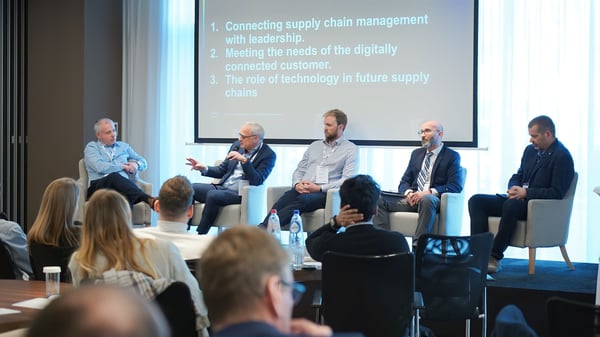I had the pleasure of chairing the Global Logistics and Supply Chain Summit last week in Amsterdam. With speakers including Gladis Araujo from Mattel, Sharon Bail-Louise from MillerKnoll and Jan Bovermann from Deloitte, the agenda was packed full of interesting insights and learnings.

Whether you were at the event and want a recap or you didn’t manage to attend, I’ve pulled together my five key themes from the summit.
Five key takeaways:
1. The end customer needs to be at the heart of everything
When planning and executing on a supply chain strategy, the customer should always be front of mind. As supply chain professionals, we also need to be customer experts. As John McFall, Head of Supply Chain at Amazon Web Services said: We need to know what they need and what they want.
So ask yourself: is this journey going to create happy end customers? Is it going to give them the simplest journey possible? If the answer is no then it’s likely you’ve designed a supply chain that benefits your business rather than your customers, which is a recipe for failure.
2. Digitalisation has to be on the roadmap
Digitalisation is often a buzzword thrown around. As highlighted by Philip Ashton, CEO at 7bridges, we can see the direct benefits and impact of digitalisation in the last 10 years in departments such as Marketing, but when it comes to supply chain we’re lagging behind.
The next five years in the supply chain are going to reinvent how we operate if businesses adopt digitalisation in this department in the same way they have in others. Technology is a supply chain professionals best friend right now and a common theme throughout the summit was the openness to partner and the acknowledgement of the host of suppliers available to help corporations solve their issues quickly and efficiently.
3. We’re still not sure where to start with reporting on Scope 3 prior to regulations coming in
Sustainability remains on the agenda for supply chain professionals, especially with the new regulations coming in next year. But most businesses are not equipped to report on Scope 3.
There were some great examples shared by Berk Kırşavoğlu, Supply Chain Specialist at Procter & Gamble, including Laagam who have adopted a zero stock policy and produce items once ordered. This approach has saved 100M+ litres of water and avoided the scrapping of on average 80,000 items per year.
But the fact remains that many businesses are struggling with net zero targets and reporting on the emissions. With the 2024 deadline approaching fast, businesses need to acknowledge the urgency of finding a solution for this.

4. If managed right, the supply chain can become your business’s USP
A resilient supply chain is seen by most as a must post-covid. But according to Jan Bovermann, Digital Supply Chain Management Distribution and Logistics at Deloitte, we need to use the word resilience with a lot of care.
When each person is asked what a resilient supply chain is, they will likely give a different answer. In order to truly create a supply chain that is prepped to overcome potential disruptions, each individual business must look at what outcomes are important to their business goals. Supply chains are becoming a USP for companies, but in order for this to happen across the board we need to shift from a cost driven to customer-value driven approach.
5. Outcome-driven supply chains give corporations a competitive advantage
Traditionally supply chains have been activity led and strategically decoupled, but in order to position them as a competitive advantage, businesses need to shift to a strategically integrated and value-driven approach.
This is achieved by designing a supply chain that has balanced outcomes, whether it be sustainability, cost, responsiveness, security, resilience or innovation. One outcome ultimately has to take priority, but a blend of several is important to create a strong, competitively positioned supply chain.
So there you have it: my five key takeaways from the Global Supply Chain & Logistics Summit. It was great to see common themes being spoken about across the agenda and the conversations during the event really shed a light on the challenges the industry is facing right now.
Next up is Logipharma! I look forward to seeing you there!
Want to know more about how we can make your supply chain more resilient without negatively impacting your day to day? Reach out and have a chat with one of our experts.